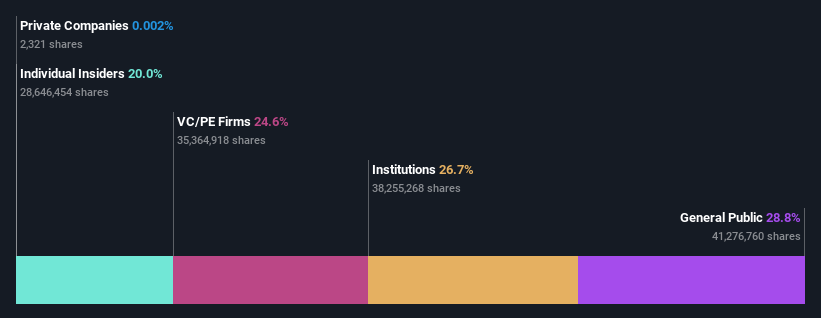While institutions own 27% of Energy Vault Holdings, Inc. (NYSE:NRGV), individual investors are its largest shareholders with 29% ownership
Key Insights
The considerable ownership by individual investors in Energy Vault Holdings indicates that they collectively have a greater say in management and business strategy
The top 8 shareholders own 51% of the company
To get a sense of who is truly in control of Energy Vault Holdings, Inc. (NYSE:NRGV), it is important to understand the ownership structure of the business. The group holding the most number of shares in the company, around 29% to be precise, is individual investors. Put another way, the group faces the maximum upside potential (or downside risk).
Meanwhile, institutions make up 27% of the company’s shareholders. Institutions often own shares in more established companies, while it's not unusual to see insiders own a fair bit of smaller companies.
In the chart below, we zoom in on the different ownership groups of Energy Vault Holdings.
Check out our latest analysis for Energy Vault Holdings
What Does The Institutional Ownership Tell Us About Energy Vault Holdings?
Many institutions measure their performance against an index that approximates the local market. So they usually pay more attention to companies that are included in major indices.
As you can see, institutional investors have a fair amount of stake in Energy Vault Holdings. This can indicate that the company has a certain degree of credibility in the investment community. However, it is best to be wary of relying on the supposed validation that comes with institutional investors. They too, get it wrong sometimes. If multiple institutions change their view on a stock at the same time, you could see the share price drop fast. It's therefore worth looking at Energy Vault Holdings' earnings history below. Of course, the future is what really matters.
Energy Vault Holdings is not owned by hedge funds. The company's largest shareholder is SoftBank Investment Advisers (UK) Limited, with ownership of 13%. Meanwhile, the second and third largest shareholders, hold 11% and 6.5%, of the shares outstanding, respectively. Robert Piconi, who is the second-largest shareholder, also happens to hold the title of Chief Executive Officer.
We did some more digging and found that 8 of the top shareholders account for roughly 51% of the register, implying that along with larger shareholders, there are a few smaller shareholders, thereby balancing out each others interests somewhat.
Researching institutional ownership is a good way to gauge and filter a stock's expected performance. The same can be achieved by studying analyst sentiments. Quite a few analysts cover the stock, so you could look into forecast growth quite easily.
Insider Ownership Of Energy Vault Holdings
The definition of company insiders can be subjective and does vary between jurisdictions. Our data reflects individual insiders, capturing board members at the very least. The company management answer to the board and the latter should represent the interests of shareholders. Notably, sometimes top-level managers are on the board themselves.
Most consider insider ownership a positive because it can indicate the board is well aligned with other shareholders. However, on some occasions too much power is concentrated within this group.
Our most recent data indicates that insiders own a reasonable proportion of Energy Vault Holdings, Inc.. Insiders own US$67m worth of shares in the US$334m company. We would say this shows alignment with shareholders, but it is worth noting that the company is still quite small; some insiders may have founded the business. You can click here to see if those insiders have been buying or selling.
General Public Ownership
The general public-- including retail investors -- own 29% stake in the company, and hence can't easily be ignored. While this size of ownership may not be enough to sway a policy decision in their favour, they can still make a collective impact on company policies.
Private Equity Ownership
With an ownership of 25%, private equity firms are in a position to play a role in shaping corporate strategy with a focus on value creation. Some investors might be encouraged by this, since private equity are sometimes able to encourage strategies that help the market see the value in the company. Alternatively, those holders might be exiting the investment after taking it public.
Next Steps:
It's always worth thinking about the different groups who own shares in a company. But to understand Energy Vault Holdings better, we need to consider many other factors. For example, we've discovered 4 warning signs for Energy Vault Holdings (1 is significant!) that you should be aware of before investing here.
But ultimately it is the future, not the past, that will determine how well the owners of this business will do. Therefore we think it advisable to take a look at this free report showing whether analysts are predicting a brighter future.
NB: Figures in this article are calculated using data from the last twelve months, which refer to the 12-month period ending on the last date of the month the financial statement is dated. This may not be consistent with full year annual report figures.
Have feedback on this article? Concerned about the content? Get in touch with us directly. Alternatively, email editorial-team (at) simplywallst.com.
This article by Simply Wall St is general in nature. We provide commentary based on historical data and analyst forecasts only using an unbiased methodology and our articles are not intended to be financial advice. It does not constitute a recommendation to buy or sell any stock, and does not take account of your objectives, or your financial situation. We aim to bring you long-term focused analysis driven by fundamental data. Note that our analysis may not factor in the latest price-sensitive company announcements or qualitative material. Simply Wall St has no position in any stocks mentioned.


